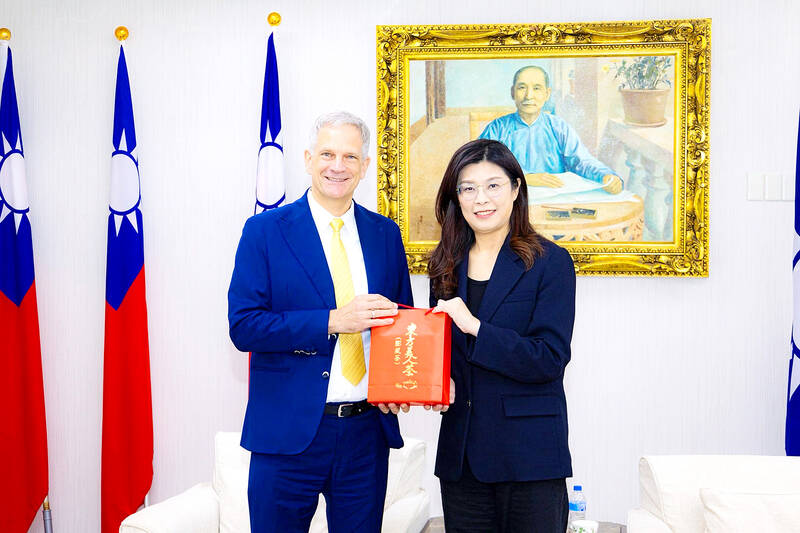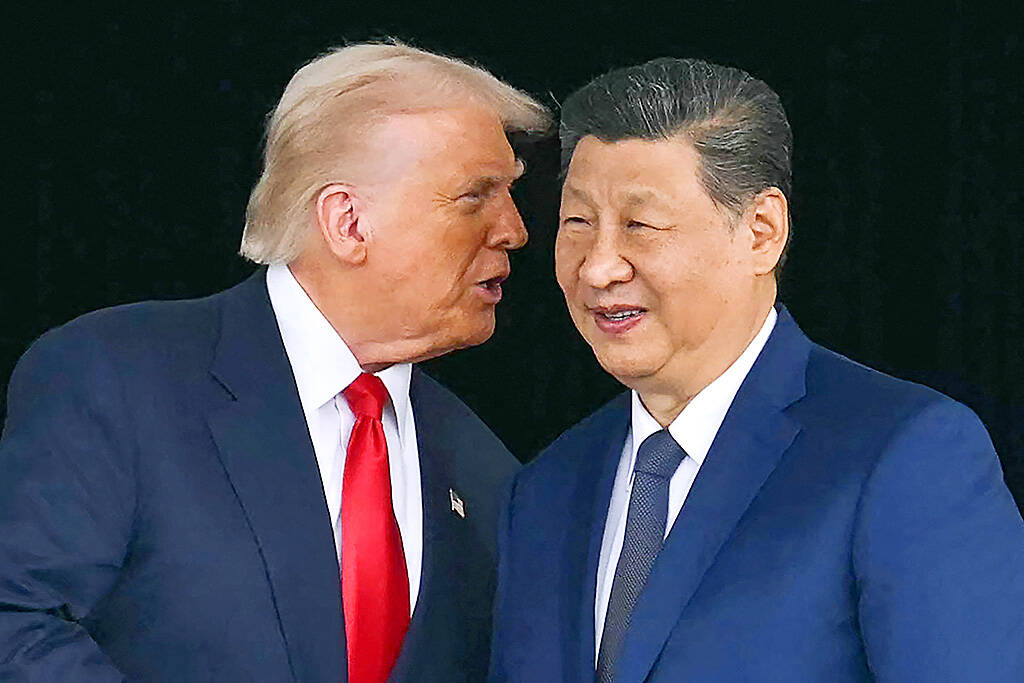Since Cheng Li-wun (鄭麗文) was elected Chinese Nationalist Party (KMT) chair on Oct. 18, she has become a polarizing figure. Her supporters see her as a firebrand critic of the ruling Democratic Progressive Party (DPP), while others, including some in her own party, have charged that she is Chinese President Xi Jinping’s (習近平) preferred candidate and that her election was possibly supported by the Chinese Communist Party’s (CPP) unit for political warfare and international influence, the “united front.” Indeed, Xi quickly congratulated Cheng upon her election.
The 55-year-old former lawmaker and ex-talk show host, who was sworn in on Nov. 1, has launched her term with a flurry of controversy: that all Taiwanese should be able to proudly say “I’m Chinese,” that Putin was democratically elected, that NATO is to blame for the Ukraine War and that the US may no longer be a reliable ally of Taiwan.
On one hand, says Brian Hioe (丘琦欣)), a political commentator and founder of the social activist media platform New Bloom, she is already being attacked from within her own party, so “people question how long she’ll last in this position.”

Photo courtesy of the Chinese Nationalist Party
But on the other hand, she has dominated daily headlines for weeks in an almost Trumpian fashion, prompting speculation that if she survives, even as a meme candidate, she could ride a wave of populism to become the KMT’s next presidential candidate in 2028, he added.
“It could go either way,” Hoie said. “She either tries to aim higher or she gets pushed out.”
But who is Cheng Li-wun? What does her recent election mean? And how big a role will she play in shaping the KMT’s future — as well as her party’s and Taiwan’s relations with Beijing and Washington?

Photo: AFP
‘WIN, WIN, WIN’
When Cheng addressed a group of foreign reporters in early October, her mic-ed up voice was so loud that organizers re-tested all three microphones in the room before concluding that Cheng’s delivery is at “talk show volume.”

Photo: AFP
At 55, Cheng is tall, thin and telegenic, with lustrous long hair falling over the shoulders of smartly tailored suits.
Though she has served various roles in the KMT since joining in 2005, including two terms as a party-list legislator and executive branch spokesperson under president Ma Ying-jeou (馬英九), talk shows helped fuel her recent rise. With an aggressive on-air personality (think FOX News), she is known for pithy, barbed soundbytes, early on from Li-wun’s Strait Talk (麗文正經話), a show she hosted in 2014 and 2015 on the TVBS cable network, and since 2020 as a regular political commentator on the major terrestrial network CTV.
At the foreign journalists’ presser, Cheng was still hot on the campaign trail, and her opening salvo was a get-out-the-vote speech she’d been hammering on her own constituents. Getting numbers needed to beat the DPP, that was the main thing, she said, before delivering a rapidfire analysis of demographics and districts.
“Win! Win! Win!” she said, pumping her fist.
The real keys, she continued, were the youth vote and the KMT’s alliance with Taiwan People’s Party (TPP), on whom the KMT depends for a coalition majority in Taiwan’s national legislature. The TPP skews to a younger, online demographic, and through the alliance, she said, the KMT would “maximize leverage.”
Many say Cheng’s fiery oration propelled her to victory in the KMT leadership race, which she won with a commanding 50 percent of the votes in a six-candidate race. Voter turnout was however low, with just 130,000, or 39 percent, of eligible KMT party members casting ballots, the second lowest turnout in KMT party history.
Generally, the KMT has struggled to maintain a clear sense of direction in recent decades, which is also to say Taiwan’s democratic era. Traditionally, the party chair position was virtually equivalent to that of Republic of China (ROC) president, and from 1938 to 2000 it was held by only three men, presidents Chiang Kai-shek (蔣介石), Chiang Ching-kuo (蔣經國) and Lee Tenghui (李登輝). It was Lee who finally broke the chain when he relinquished the presidency in 2000.
Lately, the KMT chair has become a hot seat, changing hands 14 times since 2007.
Today, according to Tso Chen-Dong (左正東), a professor at National Taiwan University, the chairperson’s major role is presiding over the party’s selection of its next presidential in 2028 — the current front-runner is Taichung Mayor Lu Shiow-yen (盧秀燕), with whom Cheng claims a “sisterly” friendship.
Cheng was even more candid.
“The party chair is no longer a king but a kingmaker,” she said.
‘DAUGHTER OF YUNNAN’
Cheng comes into her new, precarious role with a colorful, if mottled, pedigree. She calls herself a “daughter of Yunnan” after her father, Cheng Ching-hui (鄭清輝), who was born in China’s Yunnan Province in the city of Puer. During the Chinese Civil War, the elder Cheng fought for Chiang Kai-shek’s army, and then, after 1949, continued as a guerrilla fighter in Myanmar with the Yunnan Anti-Communist National Salvation Army.
A political officer tasked with enforcing party loyalty, the elder Cheng eventually “repatriated” to Taiwan, where he retired with the rank of major and settled in a military village in Taiwan’s Yunlin County. There, he married a local woman. Cheng quips that her parents are “taro and sweet potatoes,” a metaphor of ethnic integration between mainlanders and native Han Taiwanese.
Cheng entered college at National Taiwan University, where she studied law as an undergraduate and, in 1990, joined the Wild Lily Movement, which protested for direct, democratic presidential elections and Taiwan’s formal independence from China.
She joined the DPP upon graduation, and after masters degrees from Temple University in the US and Cambridge University in the UK, held some minor party offices.
But in 2002, Cheng backed false claims of sexual harassment against a fellow DPP politician, and in 2004 she became disillusioned with the party and resigned.
A year later she joined the KMT.
WARM TO BEIJING
When Cheng joined the KMT in 2005, the chair was Lien Chan (連戰), who had just lost his second straight presidential election to the DPP’s Chen Shui-bian (陳水扁). In the wake of successive failures, the KMT leader accepted an invitation to travel to China and meet its president Hu Jintao (胡錦濤) in what would become the first meeting between the KMT and the Chinese communist leaders since a 1945 summit between Chiang and Mao Zedong (毛澤東).
Cheng, who had that same year accompanied Lien to a Taipei meeting with former US president Bill Clinton, views Lien’s visit as “an historic ice breaker.”
Speaking with Hu in Beijing’s Great Hall of the People, Lien made the KMT’s most significant avowal up to that moment of its commitment to the “1992 consensus,” an idea — based on an agreement that never actually happened — that there “is only one China” and that “Taiwan is part of China,” but each side is free to interpret that differently.
The “1992 consensus” has been a core KMT position ever since, and while Cheng stands behind it as precedent that enabled the opening of direct flights and mail, institutional exchanges and limited cooperation on technical issues and law enforcement across the Taiwan Strait, she now claims the need to “form a new Taiwan consensus,” which she defines as “a more solid and comprehensive foundation for strengthening cross-strait peace.”
Cheng is unabashed about her openness to Beijing, and this separates her even from some in her own party, including old guard factions who stand firm on ROC sovereignty. During the KMT chair election, fellow candidate Jaw Shaw-kang (趙少康) accused her of being backed by China, while her main competitor, former Taipei mayor Hau Lung-bin (郝龍斌), vowed to uphold national sovereignty and differentiated between “cultural Chinese identity” and “political Chinese identity” — commitments that Cheng has seemed unwilling to make.
Cheng’s warmness to Beijing is also mirrored by her extreme skepticism of the US.
“The reason I ran for party chairman is because in Taiwan, many believe that time is not on our side. If Trump, during his four-year term, wants to make a major political deal and leave his mark on history, the most likely one I can think of is a deal with Beijing,” she said.
In such a deal, she warned, Taiwan “will have no say” and could become “a sacrifice” or a “second Ukraine.”
“This is what the Taiwanese people fear most,” she said, adding, “we will not become Trump’s bargaining chip. We must take back our autonomy and our leadership.”
For these reasons, Cheng also opposes increasing budgets for arms purchases from the US, declared that Taiwan “should not be America’s ATM.”
For many mainstream Taiwanese voters, who draw a red line at surrendering Taiwan’s de facto independence, many of Cheng’s views are beyond what they can accept, said Hoie, adding that Cheng is also creating schisms within the KMT.
“I think she will be a splitter of the party, and I think that actually is a very bad sign for her ability to maintain power,” Hoie said.
But Cheng insists that the KMT is ready for a generational changing of the guard, and that’s why she won.
“When traditional KMT politicians discuss cross-strait relations, people just aren’t interested,” she said. “But at least when I speak, people pay attention. That’s a new beginning.”

Google unveiled an artificial intelligence tool Wednesday that its scientists said would help unravel the mysteries of the human genome — and could one day lead to new treatments for diseases. The deep learning model AlphaGenome was hailed by outside researchers as a “breakthrough” that would let scientists study and even simulate the roots of difficult-to-treat genetic diseases. While the first complete map of the human genome in 2003 “gave us the book of life, reading it remained a challenge,” Pushmeet Kohli, vice president of research at Google DeepMind, told journalists. “We have the text,” he said, which is a sequence of

On a harsh winter afternoon last month, 2,000 protesters marched and chanted slogans such as “CCP out” and “Korea for Koreans” in Seoul’s popular Gangnam District. Participants — mostly students — wore caps printed with the Chinese characters for “exterminate communism” (滅共) and held banners reading “Heaven will destroy the Chinese Communist Party” (天滅中共). During the march, Park Jun-young, the leader of the protest organizer “Free University,” a conservative youth movement, who was on a hunger strike, collapsed after delivering a speech in sub-zero temperatures and was later hospitalized. Several protesters shaved their heads at the end of the demonstration. A

In August of 1949 American journalist Darrell Berrigan toured occupied Formosa and on Aug. 13 published “Should We Grab Formosa?” in the Saturday Evening Post. Berrigan, cataloguing the numerous horrors of corruption and looting the occupying Republic of China (ROC) was inflicting on the locals, advocated outright annexation of Taiwan by the US. He contended the islanders would welcome that. Berrigan also observed that the islanders were planning another revolt, and wrote of their “island nationalism.” The US position on Taiwan was well known there, and islanders, he said, had told him of US official statements that Taiwan had not

We have reached the point where, on any given day, it has become shocking if nothing shocking is happening in the news. This is especially true of Taiwan, which is in the crosshairs of the Chinese Communist Party (CCP), uniquely vulnerable to events happening in the US and Japan and where domestic politics has turned toxic and self-destructive. There are big forces at play far beyond our ability to control them. Feelings of helplessness are no joke and can lead to serious health issues. It should come as no surprise that a Strategic Market Research report is predicting a Compound